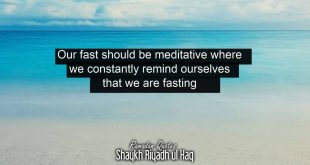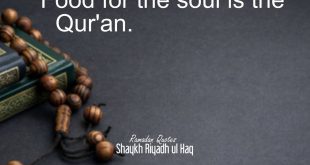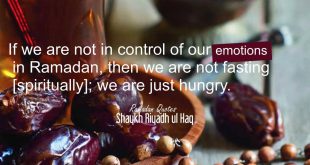“The ṣaḥābah would spend their day in the masjid when fasting. As an explanation they would say, ‘We are purifying our fast’.” – Shaykh Riyadh ul Haq
Content Soul
March, 2024
-
21 March
Ramadan 2024 – Day 11
“Our fast should be meditative where we constantly remind ourselves that we are fasting” – Shaykh Riyadh ul Haq
-
20 March
Ramadan 2024 – Day 10
“When Ramaḍān comes, Allāh removes evil influences, sanitises the environment and releases His mercy.” – Shaykh Riyadh ul Haq
-
18 March
Ramadan 2024 – Day 8
“By moving away from physical indulgence of food and drink, we are able to divert our attention and refocus on the spirit.” – Shaykh Riyadh ul Haq
-
17 March
Ramadan 2024 – Day 7
“In Ramaḍān there is an angelic presence, a diffusion of mercy and a huge reduction of evil influences. This is all part of a special climate that is prepared for our battered souls.” – Shaykh Riyadh ul Haq
-
16 March
Ramadan 2024 – Day 6
“In Ramaḍān Angels descend every evening and call out, ‘Oh seeker of good, come forward. Oh seeker of evil, desist’ [Hadith]” – Shaykh Riyadh ul Haq
-
15 March
Ramadan 2024 – Day 5
“Ramaḍān is for rehabilitation; intensive care for our souls” – Shaykh Riyadh ul Haq
-
14 March
Ramadan 2024 – Day 4
“The spirit of Ramaḍān is devotion to Allāh to the exclusion of everything else” – Shaykh Riyadh ul Haq
-
13 March
Ramadan 2024 – Day 3
“Islām teaches us ḥusnul ẓann; thinking good. Think good about others.” – Shaykh Riyadh ul Haq
-
12 March
Ramadan 2024 – Day 2
“If we are not in control of our emotions in Ramaḍān, then we are not fasting [spiritually]; we are just hungry.” – Shaykh Riyadh ul Haq
-
11 March
Ramadan 2024 – Day 1
“May Allāh make this Ramaḍān mubārak for all of us, adorn our tongues with Qurʾānic recitation, and accept our deeds and supplication. Āmīn.” – Shaykh Riyadh ul Haq
April, 2023
-
21 April
Ramadan 2023 – Eid
“Eid Mubarak to everyone! May Allah accept our deeds, and on this auspicious day may He bring peace and joy to everyone’s hearts and homes.” – Shaykh Riyadh ul Haq
-
20 April
Ramadan 2023 – Night of Eid
“O Allāh! Cause the crescent to dawn upon us with blessing and īmān and with safety and Islām. (O Crescent) my Lord and your Lord is Allāh!” – Shaykh Riyadh ul Haq
-
20 April
Ramadan 2023 – Day 29
“A person’s Eid will only be Eid if their Ramadan was Ramadan.” – Shaykh Riyadh ul Haq
-
19 April
Ramadan 2023 – Day 28
“No one will wrestle with religion except that religion will defeat him” – Shaykh Riyadh ul Haq
-
18 April
Ramadan 2023 – Day 27
“Similar to ṣalāh and ḥajj, fasting is a sacred state.” – Shaykh Riyadh ul Haq
-
17 April
Ramadan 2023 – Day 26
“When fasting we need to avoid indecency. Indecency can be in deed, speech or thought.” – Shaykh Riyadh ul Haq
-
16 April
Ramadan 2023 – Day 25
“He who wastes time in Ramaḍān is truly deprived of the virtues and forgiveness of this month.” – Shaykh Riyadh ul Haq
-
15 April
Ramadan 2023 – Day 24
“The spirit of the masjid is calmness and tranquility. Masjids are a place of silence and contemplation, of dignity and respect.” – Shaykh Riyadh ul Haq
 Al Kawthar Academy | 'The Abundance of Good' We aim to preserve and promote the pure message and sublime values of Islam.
Al Kawthar Academy | 'The Abundance of Good' We aim to preserve and promote the pure message and sublime values of Islam.




















